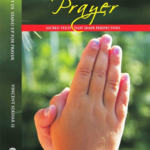The book provides a theme-wise selection of passages from scriptures from diverse religious traditions, highlighting how at the level of basic values there is tremendous shared ground between them.
Let Us Stand Up For Prayer: Sacred Texts That Shape Perspectives
Compiled by Vincent Sekhar
Claretian Publications, Bangalore
(www.claretianpublications.org)
263, Pages, Rs. 195
Reviewed By A Staff Writer
There may have been a time when people who followed (or claimed to follow) different religions felt no need to learn about other religions because they had little or no contact with their adherents. But in our closely interconnected world today, the situation is vastly different. People from different faith backgrounds are now closely interdependent all across the world, and almost all societies today are multi-religious. Peace”locally, nationally and globally”thus heavily depends on peaceful relations between people of different faith backgrounds.
For this purpose, interfaith dialogue and understanding have become an indispensable necessity. Developing an empathetic understanding of other faiths assumes greater salience given the long history of religion being used as a tool to foment conflict in various parts of the world.
The Great Similarities
Today, there is growing recognition that there can’t be peace in the world without peace between religions and those who claim to be their adherents. For this purpose, there is an urgent need to underscore the great similarities that most religions share. This book does this”and very admirably. It provides a theme-wise selection of passages from scriptures from diverse religious traditions, highlighting how at the level of basic values there is tremendous shared ground between them. In his Preface, the compiler of the book, Fr. Vincent Sekhar (a Jesuit scholar who works with the Institute of Dialogue with Cultures and Religions at Loyola College, Chennai, and is Secretary for the Commission of Interreligious Dialogue in the Jesuit Conference of South Asia) points to the fact of how sacred texts in different traditions ‘say the same thing, though in different words’, underscoring what he calls the common spiritual heritage of humanity. ‘What a common ground for all to realize this “Family of Oneness” […], travelling as pilgrims to the same goal!’, he rightly exclaims.
Core Values
Sekhar identifies 50 themes or core values, and under each he provides extracts (in English translation) from scriptures from different faith traditions that say pretty much the same thing. These traditions include Judaism, Christianity, Islam, Sikhism, Jainism, Hinduism and Buddhism. Selected themes include God’s grace, faith and prayer, knowledge and wisdom, goodness and love, equality and good governance, sanctity of nature, reverence for life and non-violence, egoism and pride, suffering, salvation and immortality, self-control and gratitude, serving others, forgiveness, friendship and kindness, duty and responsibility, peace on earth, self-sacrifice, reconciliation and unity in diversity.
An Ethical Life
These extracts from a range of scriptural texts put together theme-wise clearly bring out the ethical and spiritual oneness that underlies Divinely-inspired religions, which is something that is generally obscured by obsession with name and form and rituals and dogmas that often obscures the many commonalities of these religions. Recognising this basic oneness can facilitate a more appreciative attitude towards other faiths while also helping us recognise that religion ought to be something that we ourselves embody, in terms of leading an ethical and God-oriented life (reflected in love for God and for all fellow-creatures), rather than just being a set of dogmas to blindly believe in and rituals to mechanically perform. Learning about the oneness (in terms of basic orientations and values) that underlies Divinely-inspired religious traditions and the ample goodness in religions other than the one we may profess can be a great means for one’s own spiritual growth, and in this regard the book can serve a very useful purpose. The book can also be a very handy teaching resource in settings such as school and college assemblies and interfaith gatherings.


COMMENTS